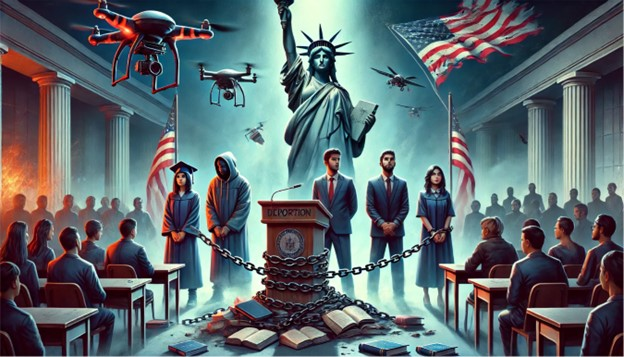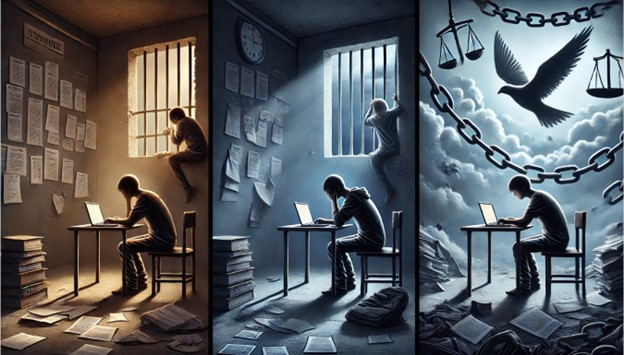Deporting Dissent: The Trump Administration’s Crackdown on International Student Activism
Input
Modified
Fear in the Halls of Academia From Peaceful Protest to Deportation Proceedings The Chilling Cost of Dissent

Fear in the Halls of Academia
A chill permeated the corridors of American universities in the spring of 2025. It was not brought by snow or wind, but by something far more insidious: terror. Many international students, particularly those of color or those who were vocal about global human rights issues, began to perceive the United States as less of a sanctuary for academic freedom and more as a location where dissent could result in deportation.
Fear was not a mere theoretical concept. It was brought to life in the narratives of individuals such as Badar Khan Suri, a postdoctoral fellow at Georgetown University who was known for his gentle voice. Masked federal agents descended upon him as he exited his Virginia residence on a tranquil morning in March. They asserted that Suri posed a national security hazard by disseminating propaganda associated with Hamas. However, Suri had no criminal record and no history of violence. His sole connections were academic: an online presence that advocated for human rights, a Palestinian-American spouse, and research conducted in conflict zones.
That was sufficient.
A little-known immigration law that permits the removal of foreign nationals whose presence is regarded to have "potentially serious adverse foreign policy consequences" was cited by the Department of Homeland Security. Despite the fact that this law had been employed sparingly in previous administrations, it was now being aggressively enforced.
Suri's situation rapidly became a rallying point for rights advocates, as she was held in an immigration facility and marked for deportation. His attorney contended that Suri's scholarship on peacebuilding, his ecumenical academic work, and his marriage to a U.S. citizen should have been considered evidence of his dedication to democratic principles, rather than justifications for expulsion.
Ranjani Srinivasan, a 37-year-old Indian doctoral student at Columbia University, was confronted with an unfamiliar form of shock from half a continent away. She was only six months away from obtaining her PhD in political science when she received a perplexing email from the U.S. consulate in Chennai informing her that her visa had been revoked. She initially dismissed it as spam, but she soon came to the realization that the message was genuine.
Men who identified themselves as immigration officials knocked on the door of her New York apartment within days. Her companion declined to grant them entry without a warrant. Nevertheless, Srinivasan was paralyzed by terror. What would happen if they returned? What would happen if she was forcibly removed and detained? She purchased a ticket to Canada the following morning, gathered what she could, and fled the country, leaving behind her research, her residence, and even her cat, Cricket.
She was never prosecuted. There was no formal hearing. Nevertheless, Homeland Security Secretary Kristi Noem publicly referred to her as a "terrorist sympathizer," citing ambiguous allegations of online support for Palestinian resistance. Columbia University was slow to respond to her requests, providing only generic legal referrals. Srinivasan's concluding statement—"Columbia failed to fulfill my expectations"—elicited an emotional response from students nationwide.
Yunseo Chung, a 21-year-old undergraduate student at Columbia and a lawful permanent resident originally from South Korea, was also impacted by this surge. What was her transgression? Engaging in a peaceful sit-in at Barnard College to express opposition to the conflict in Gaza. She was informed that her green card status had been revoked several days following the protest. Federal agents arrived at her parents' residence. ICE conducted an inspection of her dormitory. However, Chung refrained from fleeing. She engaged in combat.
Her attorneys submitted a petition contending that the United States government was retaliating against her constitutionally protected political activities. U.S. District Judge Naomi Reice Buchwald issued a provisional restraining order to prevent Chung's detention or deportation, a rare judicial rebuke of the administration. The judge determined that the government had not presented any concrete evidence to substantiate such extreme actions.
Chung's case served as a pivotal moment. It exposed the legal fragility of the administration's arguments and underscored the extent to which immigration enforcement had deviated from its original purpose. One of her attorneys stated, "This is no longer about security." "The purpose of this is to suppress opposition."

From Peaceful Protest to Deportation Proceedings
Protests on college campuses in the United States had expanded in response to Israel's military campaign in Gaza by 2025. Vigils, teach-ins, and demonstrations were organized by students to advocate for a ceasefire and the termination of the blockade. These actions were primarily student-led and peaceful, adherent to the long-standing tradition of campus activism in the United States.
However, the Trump administration promptly responded. Antisemitism and extremism were depicted as the result of university demonstrations. A narrative emerged that connected pro-Palestinian sentiment with support for terrorism. International student activists, in particular, were classified as hazards.
Students from abroad who expressed solidarity with Palestinians were targeted by the administration through visa revocations and deportation proceedings. It contended that these students were sympathetic to Hamas, a designated foreign terrorist organization, irrespective of the nature or content of their protest.
Human rights organizations, legal authorities, and civil liberties groups vigorously opposed the proposal. A statement was released by a coalition of independent UN human rights experts, who condemned the U.S. government's actions as "disproportionate, unnecessary, and discriminatory." They cautioned that these strategies would not only be punitive but would also have a debilitating effect on academic freedom and free expression.
In the interim, advocacy organizations such as the American Association of University Professors (AAUP) initiated lawsuits that contested the administration's policies. They cited numerous instances of students and scholars—including Suri, Srinivasan, and Chung—whose lives had been significantly disrupted by immigration crackdowns that lacked due process or evidentiary support in their filings.

The Chilling Cost of Dissent
As the number of cases increased, so did the repercussions. Universities were the epicenter of a political upheaval. Columbia, Cornell, Brown, and Georgetown were among the institutions that were attempting to balance federal pressure with the protection of their students.
Srinivasan's precipitous departure and the subsequent silence at Columbia resulted in a profound void. Greater transparency and support systems for international students were demanded by student groups. Despite the fact that faculty members issued statements of solidarity, the damage had already been done for many.
While expressing concern, Indian officials underscored the importance of students adhering to local laws. Referring to the broader crackdown that had also resulted in the deportation of undocumented Indian nationals from the United States, Sushil Sukhwani, the director of the consultancy Edwise International, cautioned students against taking legal shortcuts.
However, the lesson was painfully apparent to students such as Suri and Srinivasan, who had entered legally, followed the rules, and excelled academically: legality provides no protection when politics decides otherwise.
The implications are significant, given that the United States has over 300,000 Indian students and an estimated $8 billion in economic contributions each year. Numerous students and their families are currently reevaluating the United States as a destination. Students have been advised by advisors and embassy officials to refrain from participating in any political activities, including social media posts.
Before the spring break, numerous universities issued travel advisories, cautioning international students to refrain from departing the country, as reentry could not be guaranteed. A physician from Brown University was subjected to the cancellation of her visa upon her return from Lebanon, which resulted in perplexity and outrage.
In the interim, the academic community as a whole continues to grapple with the ramifications of these advancements. A fundamental shift in the treatment of dissent on American soil is represented by the use of immigration law as an instrument of political repression. For decades, the United States has taken pride in its reputation as a magnet for the world's most brilliant minds. Presently, it is at risk of becoming a cautionary tale.
The experience has been life-changing for Badar Khan Suri, Ranjani Srinivasan, and Yunseo Chung. Exile, anxiety, and legal disputes were the consequences of what began as an endeavor to acquire knowledge. Their narratives resonate across continents and campuses, prompting urgent inquiries regarding the future of academic freedom and the role of international students in American society.
At one time, the United States requested that the world submit its most talented and accomplished individuals. The message is now altered: dissent is perilous, and for certain individuals, it is accompanied by a deportation order.





















